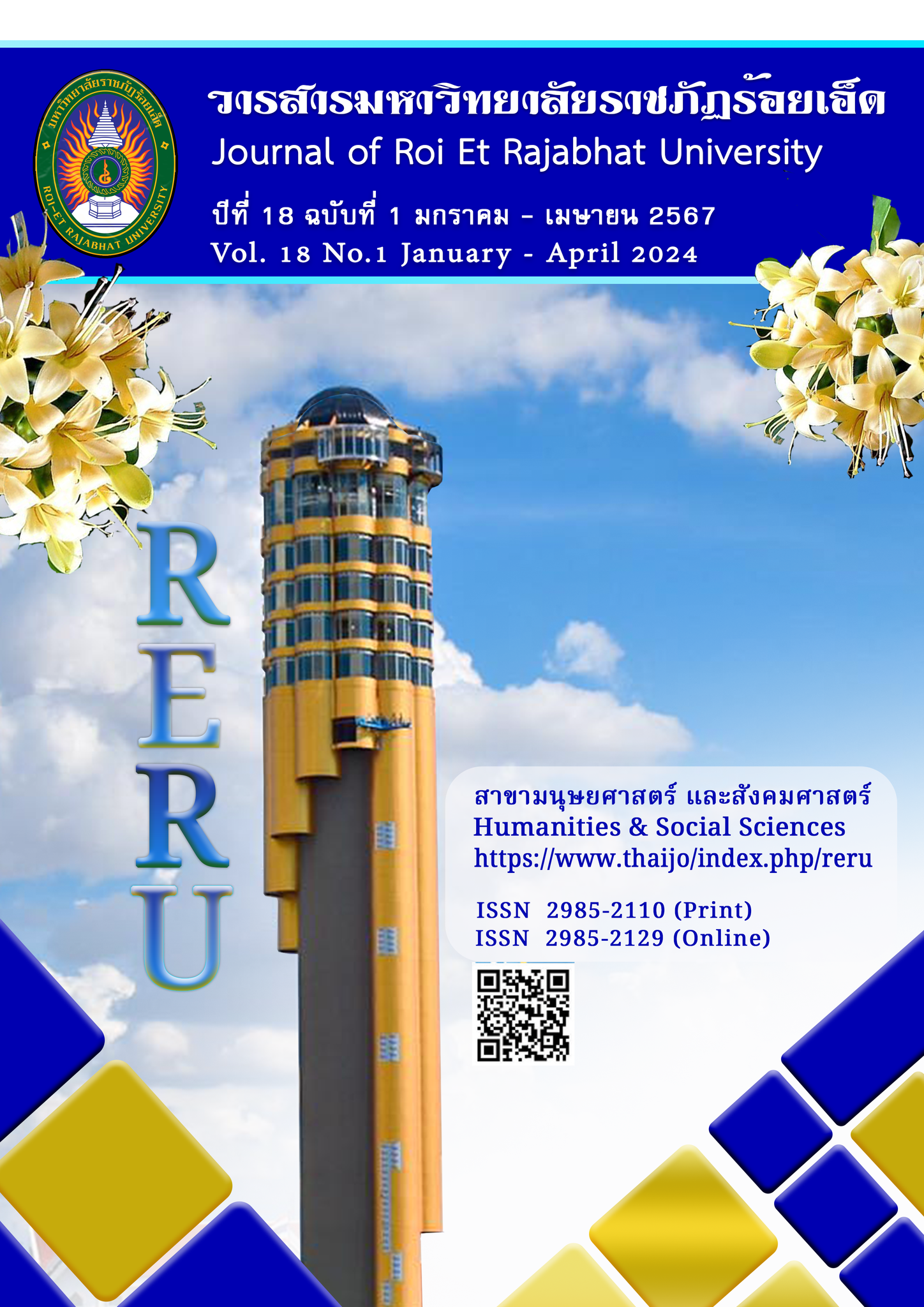Development of the Active Learning Model to Enhance the Analytical Thinking Capability and Achievement in Learning Morality, Ethics and Code of Ethics for Teachers Course of Primary Education Program Student in Northern College
Keywords:
Learning management model, Active learning, Analytical thinking capabilityAbstract
This research objectives were: 1) to study the guidelines of creating a model of active learning to enhance analytical thinking capability and learning achievement of students in learning the course of morality, ethics, and code of ethics for teachers; 2) to create and verify the quality of the active learning model; and 3) to compare analytical thinking capability, and achievement of students in learning the course of morality, ethics, and code of ethics for teachers. The samples were 60 bachelor’s degree program students in elementary education of Northern college in academic year of 2022, which randomized through cluster sampling. The instruments were learning management plan, analytical thinking capabilities test, the learning achievement test of the course of morality, ethics, code of ethics. The data were analyzed by using mean, standard deviation, t-test (dependent samples).
The results were: 1) the model of learning management consists of 6 steps: 1.1 attendance stimulation, 1.2 data searching, 1.3 data recall, 1.4 practice, 1.5 interpret and results; and 1.6 evaluate; 2) the result of propriety verification of model quality was at the highest level; 3) students capabilities of analytical thinking after learning were higher than before learning, and higher than the 70 percent of determined criteria with statistically significant at .01 level. The students learning achievement after learning the course of morality, ethics, and code of ethics were higher than before learning with statistically significant at .01 level.
References
ไชยยศ เรืองสุวรรณ. (2553). Active Learning. เชียงใหม่: หน่วยส่งเสริมและพัฒนาวิชาการคณะเภสัชศาสตร์
มหาวิทยาลัยเชียงใหม่.
ทิศนา แขมมณี. (2550). การสอนจิตวิทยาการเรียนรู้เรื่องศาสตร์การสอนองค์ความรู้เพื่อการจัดกระบวนการเรียนรู้
ที่มีประสิทธิภาพ (พิมพ์ครั้งที่ 5). กรุงเทพฯ: จุฬาลงกรณ์มหาวิทยาลัย.
ทิศนา แขมมณี. (2544). วิทยาการด้านการคิด. กรุงเทพฯ: เดอะมาสเตอร์กรุ๊ป แมเนจเม้นท์.
ปรียานุช พรหมภาสิต. (2559). คู่มือการจัดการเรียนรู้ “Active Learning (AL) for HuSo at KPRU. กำแพงเพชร:
มหาวิทยาลัยราชภัฏกำแพงเพชร.
พิมพันธ์ เดชะคุปต์. (2561). การเรียนรู้เชิงรุกแบบรวมพลังกับ PLC เพื่อการพัฒนา. กรุงเทพฯ: จุฬาลงกรณ์มหาวิทยาลัย
วัชรา เล่าเรียนดี. (2554). รูปแบบและกลยุทธ์การจัดการเรียนรู้เพื่อพัฒนาทักษะการคิด (พิมพ์ครั้งที่ 8). นครปฐม: มหาวิทยาลัย
ศิลปากร.
ศูนย์ส่งเสริมและพัฒนาอาชีวศึกษาภาคเหนือ. (2561). รายงานผลการนิเทศติดตามโครงการการจัดการเรียนรู้แบบโครงงาน
เป็นฐาน. สืบค้นเมื่อ 10 ธันวาคม 2566, จาก http://www.nsdv.go.th
สถาพร พฤฑฒิกุล. (2555). คุณภาพผู้เรียน...เกิดจากกระบวนการเรียนรู้ (QUALITY OF STUDENTS DERIVED FROM ACTIVE
LEARNING PROCESS). วารสารการบริหารการศึกษา มหาวิทยาลัยบูรพา, 6(2), 1-13.
สุวิทย์ มูลคำ. (2548). กลยุทธ์การสอนคิดเชิงกลยุทธ์. กรุงเทพฯ: ภาพพิมพ์.
สำนักงานคณะกรรมการการศึกษาขั้นพื้นฐาน. (2562). แนวทางการนิเทศเพื่อพัฒนาและส่งเสริมการจัดการเรียนรู้เชิงรุก
(Active Learning) ตามนโยบายลดเวลาเรียน เพิ่มเวลารู้. กรุงเทพฯ: ชุมนุมสหกรณ์การเกษตรแห่งประเทศไทย.
Brandenburg, R., McDonough, S., Burke, J. and White, S. (2016). Teacher Education Research and the Policy
Reform Agenda. Singapore: Springer.
Joyce, B. and Weil, M. (1996). Models of teaching (5th ed.). London: Allyn and Bacon.
Mckinney, S. E. (2008). Developing teachers for high-poverty schools: The role of the internship experience.
Urban Education, 43(1), 68-82.
Ornstein, A. C. and Hunkins, F. P. (2014). Curriculum Foundations, Principles (6th ed.). USA: Pearson Education
Limited.
Downloads
Published
How to Cite
Issue
Section
License
Copyright (c) 2024 Roi Et Rajabhat University

This work is licensed under a Creative Commons Attribution-NonCommercial-NoDerivatives 4.0 International License.
บทความที่ได้รับการตีพิมพ์เป็นลิขสิทธิ์ของวารสารมหาวิทยาลัยราชภัฎร้อยเอ็ด
ข้อความที่ปรากฏในบทความแต่ละเรื่องในวารสารวิชาการเล่มนี้เป็นความคิดเห็นส่วนตัวของผู้เขียนแต่ละท่านไม่เกี่ยวข้องกับมหาวิทยาลัยราชภัฎร้อยเอ็ด และคณาจารย์ท่านอื่นๆในมหาวิทยาลัยฯ แต่อย่างใด ความรับผิดชอบองค์ประกอบทั้งหมดของบทความแต่ละเรื่องเป็นของผู้เขียนแต่ละท่าน หากมีความผิดพลาดใดๆ ผู้เขียนแต่ละท่านจะรับผิดชอบบทความของตนเองแต่ผู้เดียว





